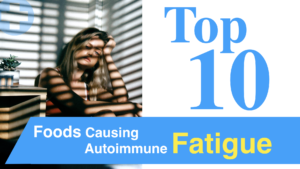Inflammation Causing Your Headaches

As I’ve been discussing headaches in recent posts we need to look at another very common source of headaches that occur very commonly in those with autoimmune diseases. Inflammation.
During my long years of trying to heal from my autoimmune disease, I had to deal with headaches on a regular basis. Some were mild and manageable, others would hurt a little worse, but every now and then I would get one that was absolutely head-splitting. Many times these severe headaches would be accompanied by vomiting, which leads me to think they were most likely migraines.
Why do headaches occur in autoimmune diseases? First of all, it’s important to note that there are many non-autoimmune related causes of headaches such as neck and back trauma, dehydration, stress, irregular eating and sleeping times, medications, and hormone imbalances.
Around 45 million people complain of headaches each year.1 The reason why this is important to know is because if you are experiencing headaches, there may be more factors than simply your autoimmune disease that is contributing to them. Meaning, if your autoimmune disease disappeared right now, you might still experience headaches due to the other reasons.
If you operate on a continuous round of stress, if you have an untreated accident injury, or don’t drink enough water, then reversing your autoimmune condition won’t make the headaches go away. They may improve, but you’ll still have them.
Here are several of the main types of headaches:
- Tension headaches
- Migraine headaches with or without aura
- Cluster headaches
- Muscle contraction headaches
- Headaches that are persistently on one side only
- Exertion headaches
- Cranial nerve inflammation headaches
- Headaches due to:
- trauma
- disorders: such as autoimmune
- infections: such as sinus
- structural problems with the bones
- substance abuse or withdrawal
- dehydration
Autoimmune Headache Sources
As you can see, headaches really are a big topic and can come from so many different possible places. Because of this, one needs to back up a little and look at the big picture of your overall lifestyle and try to identify all the potential factors.
Having said that, it’s also possible that your autoimmune disease is the main culprit behind all your headaches. We personally know people who almost suddenly started getting a near continuous round of headaches. This symptom alone was what motivated them and their family to start looking more into health possibilities which eventually led them to the likelihood of autoimmunity.
Let’s look at several potential ways in which autoimmune diseases contribute to headaches. Autoimmune disorders can cause headaches by:
- inflammation
- demyelination of the nerves
- food sensitivities
- vasculitic ischemia (which is blood vessel inflammation2 3 4 5)
- endocrine dysregulation
- neurotransmitter dysregulation
- issues leading to vasodilation and vasoconstriction
The Common Factor
In my experience with many autoimmune patients headaches seem to be induced by food and inflammation. As with fatigue and rashes, it’s no surprise that headaches finds a common factor in a damaged gut. All the above issues can find a original source in a damaged digestion system. From the research and clinical evidence I've seen when people focus on not agitating their gut with problematic foods while simultaneously healing it, headaches and other autoimmune symptoms get better. Now it’s not the only factor but it’s definitely a big one.
Inflammation
Let’s start with inflammation. But before we get right into it, let’s first cover some basics. Many headaches are due to vasodilation (dilation of blood vessels and decrease of blood pressure) and vasoconstriction (constriction of blood vessels and increase of blood pressure).

There is an ideal amount of blood flow that the brain needs, and too much or too little blood flow to the brain will often result in headaches. To give you a practical example of this, think about the person trying to stop drinking coffee. What’s one of the first issues they run into? Headaches. Why? The reason is because coffee decreases blood flow to the brain by about 30%.

Therefore, when a person drinks coffee every day, the body compensates to keep that blood flow balance by pumping additional blood to the brain. What happens when the coffee drinker suddenly stops drinking coffee?
The body is still used to pumping that additional blood to the brain but now it doesn’t need it. So now instead of that additional blood bringing the blood level up to par, it’s adding way too much blood to the brain resulting in pressure in the head and a headache.
How Chronic Inflammation Creates Headaches
When the body is experiencing chronic inflammation, things start breaking down. It’s a slow but sure tearing down process of the tissues and organs of the body. Chronic inflammation causes multiple chemical processes that lead to vasodilation and vasoconstriction. Inflammation effects the size of blood vessels (vasculitic ischemia) which also can effect blood flow, causing headaches.
Also, there is a thin barrier of spinal fluid between your brain and skull which extends down from the skull into the spine. This is called cerebrospinal fluid (CSF). There is a fine balance of how much of this fluid there is supposed to be. Anything that causes a disruption in that fluid balance may result in headaches.
I currently can’t find any literature about this, but my theory is that too much or too little blood flow to the brain can effect this fluid resulting in headaches. Researchers have found that inflammation in the space that carries CSF “results in headache.” As a result of autoimmune diseases, it’s believed that inflammation may occur in the blood vessel walls around the brain due to the release of pro-inflammatory neurotransmitters. For example, lupus is known to inflame blood vessels in the brain.6
Chronic inflammation lies at the foundation of all autoimmune diseases. This inflammation can occur at almost any location in the body, and unfortunately, one of these locations can be the brain.
Another way inflammation contributes to headaches is by the release of chemicals that contribute to pain. It’s been found that inflammation of pain sensitive structures in the brain with the subsequent release of certain body chemicals like substance P, calcitonin gene-related peptide, and cytokines produces pain.7
Obviously we want to avoid inflammation anywhere but especially in the brain. At the end of this post I’ll give you some tips on how you can start doing that. But before that we next need to look at what this continual brain inflammation can lead to.
Inflammation Causing Neurological Damage Leading to Headaches
Neurological damage is a common result of many different autoimmune diseases such as SLE, MS, and fibromyalgia.8 Many studies have reported that headaches are more common in SLE than the control patients.9 10 One of the ways in which autoimmune diseases cause neurological damage is by damaging the myelin sheath of our nerves fibers interrupting nerve transmission. This ongoing attack produces inflammation. There’s an entire autoimmune disease categorized for when your body attacks your myelin sheath called Guillain-Barré syndrome. When your nerves are not firing right, a host of issues results, and one of them is pain which sometimes manifests in headaches.
This inflammation and damage effects our neurotransmitters. The reason why this can result in headaches is because many of the neurotransmitters cause vasodilation or vasoconstriction. For instance, glutamate and GABA are vasodilators. Serotonin and acetylcholine are vasoconstrictors. In addition, glutamate increases pain perception. When these neurotransmitters are not properly regulated, it can lead to too much or too little blood to the brain resulting in headaches.
The take away point is if you have on going inflammation, it could lead to this neurological damage that is likely to result in headaches.
So where do you start?
How can you naturally relieve a migraine? Where should you start to decrease inflammation? These next two posts have the answers.
How to Calm an Autoimmune Migraine
3 Common Toxins Causing Inflammation In Your Kitchen!
Sources
- http://www.ihateheadaches.org/headache-statistics.html
- Katsiari CG, Vikelis M, Paraskevopoulou ES, Sfikakis PP, Mitsikostas DD. Headache in systemic lupus erythematosus vs multiple sclerosis: A prospective comparative study. Headache. 2011;51:1398-1407.
- Tjensvoll AB, Harboe E, Goransson LG, et al. Migraine is frequent in patients with systemic lupus erythematosus: A case-control study. Cephalalgia. 2011;31:401-408.
- Gokcay F, Oder G, Celebisoy N, Gokcay A, Sirin H, Kabasakal Y. Headache in primary Sjogren's syndrome: A prevalence study. Acta Neurol Scand. 2008;118:189-192.
- Rampello L, Malaguarnera M, Rampello L, Nicoletti G, Battaglia G. Stabbing headache in patients with autoimmune disorders. Clin Neurol Neurosurg. 2012;114:751-753.
- https://www.dartmouth.edu/~dons/part_2/chapter_18.html
- John, S. and Hajj-Ali, R. A. (2014), Headache in Autoimmune Diseases. Headache: The Journal of Head and Face Pain, 54: 572–582. doi:10.1111/head.12306
- John, S. and Hajj-Ali, R. A. (2014), Headache in Autoimmune Diseases. Headache: The Journal of Head and Face Pain, 54: 572–582. doi:10.1111/head.12306
- Weder-Cisneros ND, Tellez-Zenteno JF, Cardiel MH, et al. Prevalence and factors associated with headache in patients with systemic lupus erythematosus. Cephalalgia. 2004;24:1031-1044.
- Whitelaw DA, Hugo F, Spangenberg JJ, Rickman R. Headaches in patients with systemic lupus erythematosus: A comparative study. Lupus. 2004;13:501-505.




